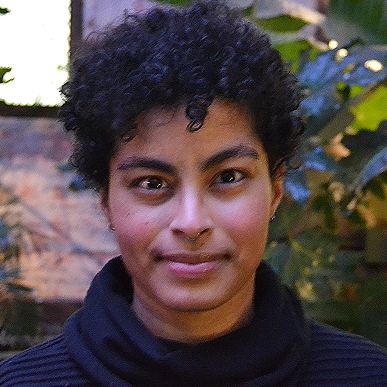How Ataya works: One presenter and their work – in exchange with the audience. Each Ataya session engages with selected work by the presenter (a text, artwork, performance, even food). The presenter introduces their work and grounds the subsequent discussion with the participants. For best engagement, we recommend participants to view the work (made available in advance on our website) before the session. More on the Ataya Series
Ataya: HUMA Interdisciplinary Seminar Series
Speaker: Alírio Karina (University of the Witwatersrand, South Africa)
Project/Paper: coming soon

Bio: Alírio Karina is a NRF Postdoctoral Fellow in the Archive and Public Culture Research Initiative at the University of Cape Town, and Associate Faculty at the Brooklyn Institute for Social Research. They received a PhD in History of Consciousness from the University of California Santa Cruz in 2019, with a dissertation titled “Abject / Ethnographic / Africa: Material Encounters along the Cape-to-Cairo Route”. Their current book project builds on this dissertation work, expanding it to offer a theorisation of historical and political transformations and consequences of anthropological thought and their relationship to sedimenting conceptions of race, indigeneity and Africanity. Alongside extensive conference and research workshop organisation, they are a co-editor of a forthcoming special issue of Social Dynamics examining archival loss and destruction and its consequence for thinking African Studies and have articles in the journals Diacritics, Third Text, Postmodern Culture and Safundi.
Topic: This paper offers a historico-political exegesis of V-Y Mudimbe’s Invention of Africa and Idea of Africa, reading how these texts respond to a post-independence African context of political and epistemic despair. This despair reflects at once the desire for a non-Western claim to knowledge and life, for political and economic autonomy from the West, and the seeming impossibilities (confirmed by the political ordinary) of enacting these. Retracing Mudimbe’s analysis of African political thought in the wake of Négritude and his critique of representation, this essay works through Mudimbe’s intellectual historical methods to draw out a subtextual response to questions of historicity, political commitment, and the role of intellectual thought in Black resistant response. I argue that these questions are instantiated in the concept of “absolute discourse.” This concept reveals a theory of speech, inhabitation, and contingency critically aligned with postcolonial Marxist demands for authenticity, sovereignty and authority. Moreover, through this, and against any presumption of futility, I argue that Mudimbe constitutes a theory of politics – of resistance, claim, and seizure, and their limits – and contingency amidst seeming and real epistemic and material closures.
